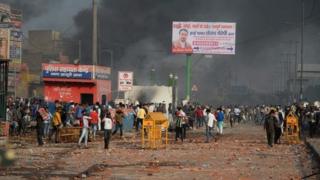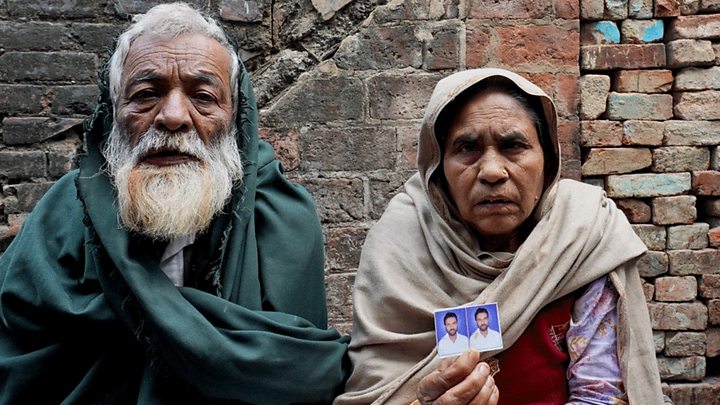 Image copyright
AFP
Image copyright
AFP
Three people have been killed in Delhi in protests over India's controversial new citizenship law, hours before a visit by US President Donald Trump.
A policeman and two Muslim civilians died in the capital's deadliest day since the new law was passed last year.
Vehicles were set alight in the clashes, between supporters and opponents of the law, which critics say targets India's 200 million Muslims.
Parts of the city remain tense as Mr Trump prepares for talks on Tuesday.
On Monday the US leader, who is on his first official trip to India, visited the Taj Mahal with his wife Melania.
Earlier in the day they had flown in to a colourful reception by huge crowds in Gujarat, the home state of India's Prime Minister Narendra Modi.
The Trump visit comes at an opportune time for Mr Modi, whose government has been under pressure in recent months.

Tens of thousands of people in cities across Hindu-majority India have been protesting against the new Citizenship Amendment Act (CAA), which grants amnesty to non-Muslim immigrants from three nearby Muslim-majority countries. About 30 people have been killed in the protests.
Mr Modi's Hindu nationalist government says the law is to protect persecuted minorities.
Critics say it is part of an agenda to marginalise Muslims.
The violence in Muslim-majority areas in north-east Delhi began on Sunday and continued into Monday. It is the first time a member of the security forces has been killed in the unrest around India since it erupted late last year.
Police fired tear gas shells and led baton charges to disperse the stone-throwing crowds. Twenty-five people were injured. TV footage showed flames and smoke billowing from buildings.
Delhi's freshly re-elected Chief Minister Arvind Kejriwal, called on the federal government to restore law and order.
The capital's police force reports directly to the federal government, run by India's ruling Bharatiya Janata Party (BJP).
One of its leaders had threatened a group of protesters staging a sit-in against the CAA over the weekend, telling them that they would be forcibly cleared once Donald Trump had left India.

The new law has raised fears that India's secular status is at risk.
It came after Mr Modi's government revoked the partial autonomy of the disputed territory of Indian-administered Kashmir in August, sparking protests in the Muslim-majority valley. Mobile phone connections and the internet have only been partially restored, and political leaders there are still under house arrest along with hundreds of others.
The two decisions have sharply polarised India, and have been questioned by leaders abroad.
Mr Modi and Mr Trump, who lead the world's two largest democracies, are to hold formal talks in the capital on Tuesday.
But amid the fanfare, a much-talked about trade deal is unlikely to happen during the Trump trip.
The US is one of India's most important trade partners, with bilateral trade totalling $142.6bn (£110.3bn) in 2018. The US had a $25.2bn goods and services trade deficit with India, its ninth largest trading partner in goods.
Despite growing political and strategic ties, there's been tension over trade issues. Mr Trump has said India's tariffs - taxes on imports - are "unacceptable", and has described India as the "king" of tariffs.
The US leader will raise concerns about religious freedom in India during his trip, a senior US official told reporters, calling them "extremely important to this administration", AFP news agency reports.